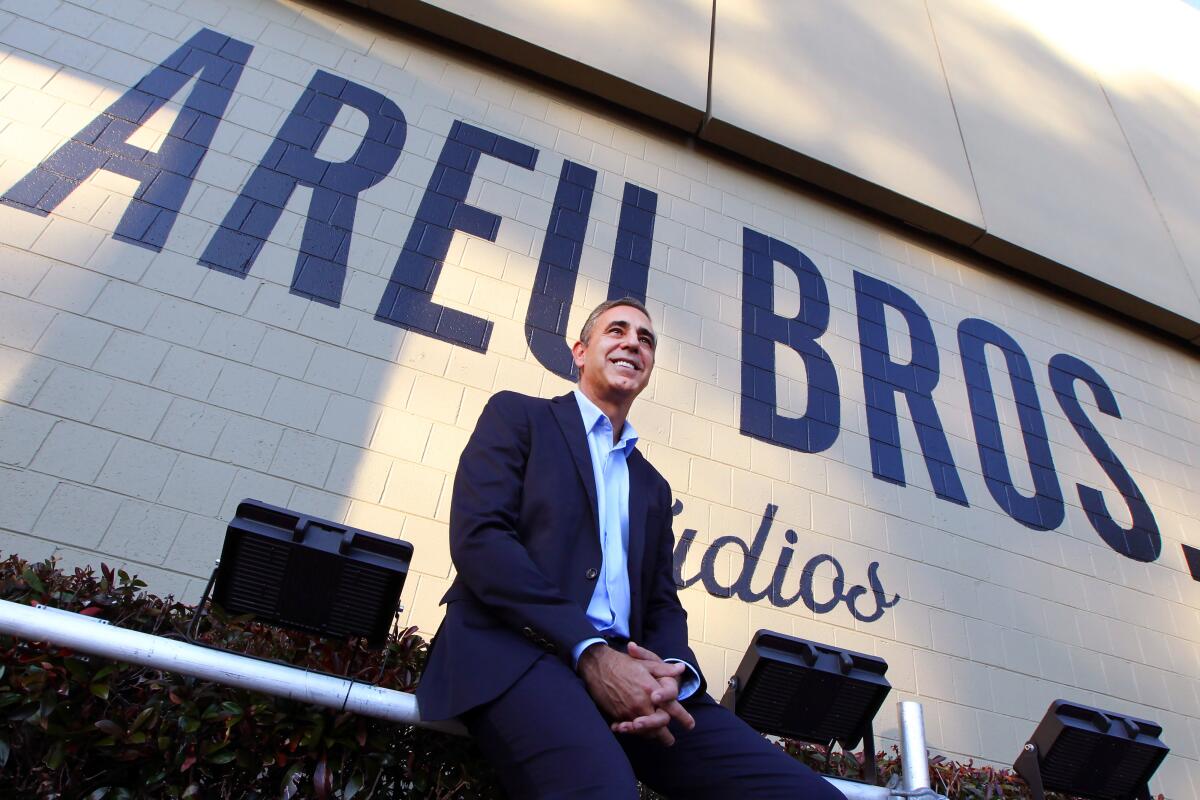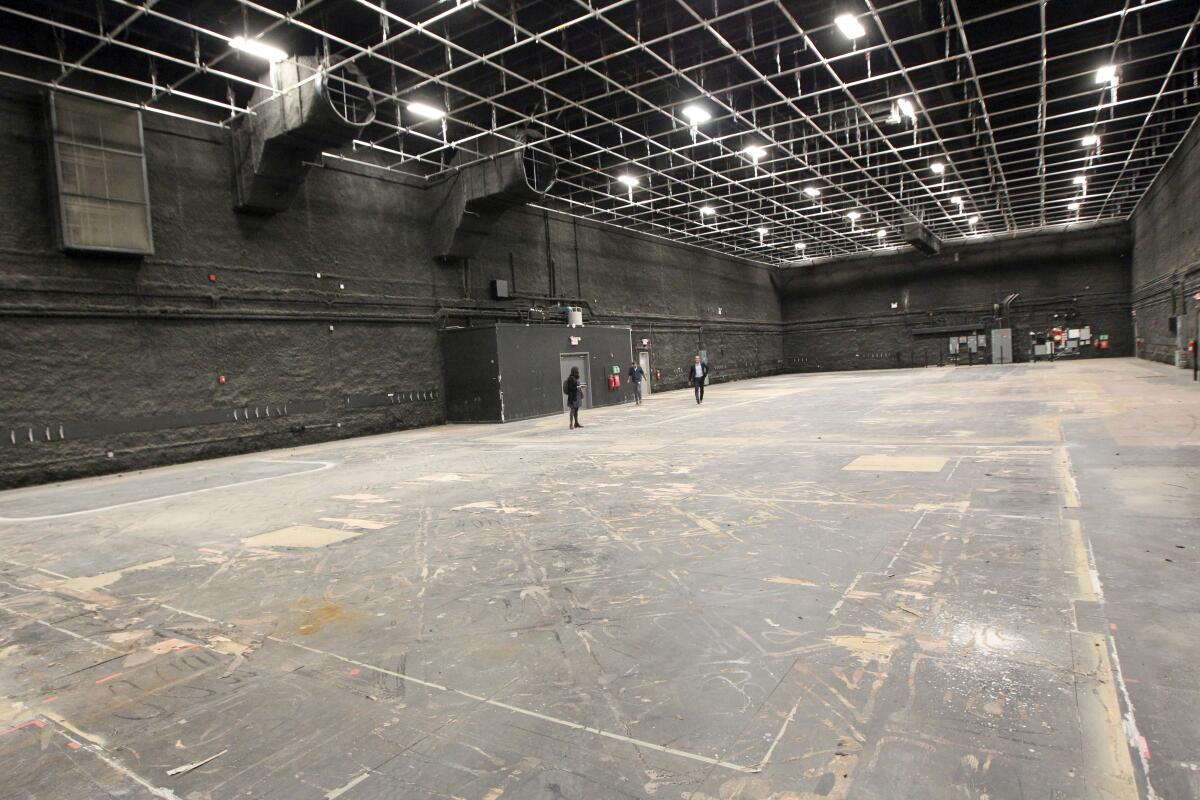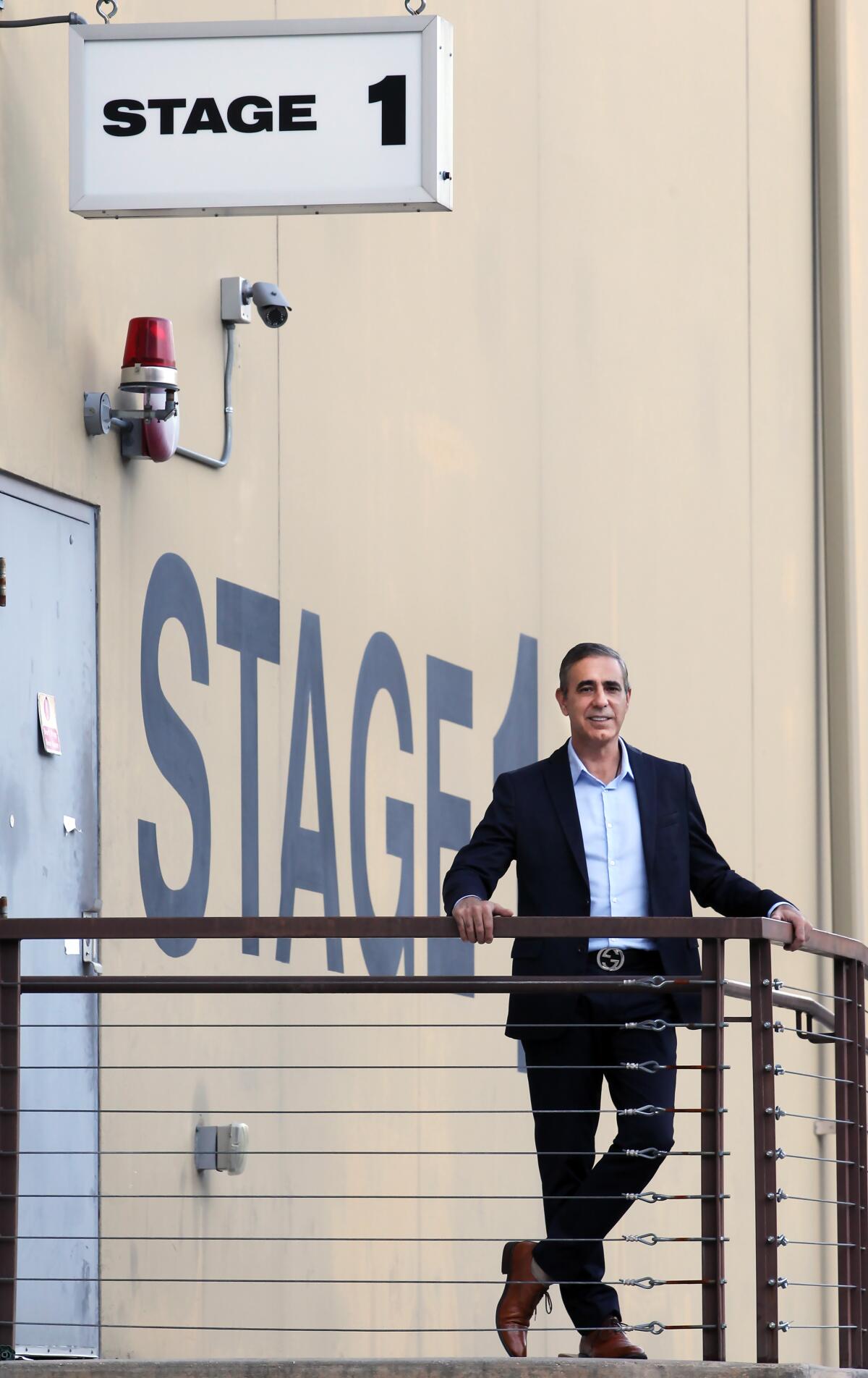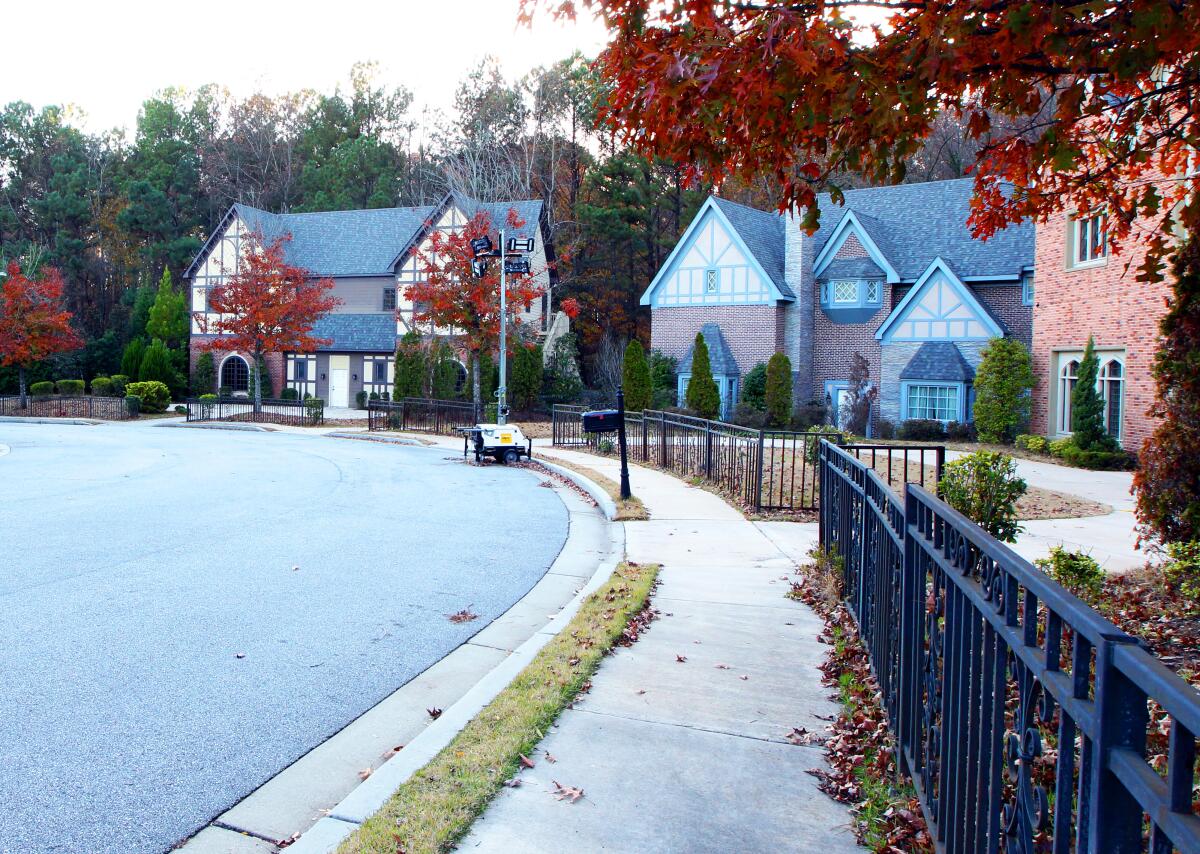Meet the creator of one of the nation’s first major Latino-owned film studios

- Share via
ATLANTA — Growing up in Burbank as the son of Cuban immigrants, Ozzie Areu never dreamed of a career in Hollywood. The big film studios just a few miles away from his family’s modest home were remote walled-off compounds, so removed from the hustle and grind of his family’s day-to-day life that they felt like another world.
Areu wanted to be a cop. But as he likes to say, God had another plan. After taking a job as a security guard at Warner Bros., he got the film bug.
For the record:
11:30 a.m. Jan. 13, 2020The article originally stated that Jennifer Lopez founded Believe Entertainment Group, a New York-based digital entertainment company. She did not form Believe but, with her Nuyorican Productions, partnered with Believe to produce a pop culture show for Latino teens.
More than 25 years later, Areu presides over one of the nation’s largest Latino-owned and operated film studios: a sprawling 60-acre site in Atlanta that he plans to turn into an inclusive media campus that champions Latino, women and other underrepresented groups in entertainment. Areu Bros. aims to venture across multiple platforms — not just motion pictures and TV, but digital streaming, music and gaming — with story lines that go beyond old Hollywood stereotypes and shallow tokenism.
“Minorities want to see ourselves in different roles — not just the mechanic, the gardener, the maid,” said Areu, 47, a smooth, genial George Clooney-esque businessman. “I feel I have a unique opportunity to build a media company made up of people who reflect the world that we live in.”


Ironically, the Areu complex is not in Los Angeles, where Latinos make up nearly half of the population, but in a poor, mostly black neighborhood of southwest Atlanta. That’s because Areu has taken over a studio that was previously owned by his former boss and mentor, Tyler Perry, the director, actor and producer who has amassed an estimated $600-million fortune making commercial blockbusters for a largely black audience.
After working for Perry for more than a decade, Areu left his job last year as president of the studio in the hope of extending Perry’s business model across a broader cross section of minority and female voices.
Areu, though, is quick to stress that he does not want to restrict himself to Latino or female audiences.
“Our stories aren’t going to just be Latino stories or stories around women,” he said. “There will be some, but even in those stories, you’re going to need white American males and you’re going to need a little bit of everything. The most important thing is the substance and authenticity of the story.”
While it may seem startling to see a Latino in the Deep South play a leading role in advancing diversity in the entertainment industry, it makes logical sense, said Benjamin Lopez, head of the National Assn. of Latino Independent Producers, a Los Angeles based nonprofit that supports Latino writers, producers and directors.
Not only has Areu gathered a wealth of knowledge as he helped Perry build his media empire, but Georgia is one of the nation’s leading film production locations with a solid infrastructure of experienced crews and a burgeoning community of actors, bolstered by generous tax incentives for film and TV production.
“His studio is a breakthrough, watershed moment for Latinos in the U.S. and globally,” said Lopez, who has worked with Areu over the last year, recommending emerging Latino voices. “What he’s doing is investing in U.S.-based Latinos and giving this generation of talent a shot in the arm, an opportunity to prove themselves and show their work is profitable. That’s going to signal to the studios: Guess what? This dude is taking a chance already. He’s first dollar in.”
Areu follows a small but growing number of Latinos who have set up film production companies in the last few decades. In 1991, filmmaker Robert Rodriguez co-founded Los Hooligans Productions, now named Troublemaker Studios, a film production company in Austin, Texas. In 2001, Jennifer Lopez co-founded Nuyorican Productions, which produces film, TV and online content in Los Angeles, and later went on to partner with Believe Entertainment Group, a New York-based digital entertainment company, to produce a pop culture show for Latino teens. In 2005, Eva Longoria started UnbeliEVAble Entertainment, a film, television and documentary production company in Los Angeles.
Yet Latinos continue to lag in Hollywood. While about 18% of U.S. residents are Hispanic or Latino, a report released this year by the USC Annenberg Inclusion Initiative found that in 1,200 top-grossing films released from 2007 to 2018, just 4.5% speaking or named roles went to Latino actors. Only 4% of those films were made by Latino directors and 3% by Latino producers.
Stereotypes were also rife, the study found, with about a quarter of top-billed and all Latino-speaking characters across 200 movies cast as criminals and 17% as poor or lower income.
Still, there is growing momentum to push diversity.
In the last few years, a flurry of movies with diverse casts — including “Star Wars: The Last Jedi,” “Black Panther” and “Crazy Rich Asians” — have found commercial success at the box office.
A few big blockbuster musical films coming out in 2020 — Lin-Manuel Miranda’s “In the Heights” based on his Tony Award winning show and Steven Spielberg’s version of “West Side Story” — will center around the experience of Latino Americans. Three months ago, Longoria was hired by executive producer Samuel Rodriguez to direct “Flamin’ Hot,” a biopic about Richard Montanez, a Mexican immigrant and janitor who created the Flamin’ Hot Cheetos snack.
The prospect of building a film studio for minorities in Georgia is not without potential risks.

A fledgling company with only about 12 full-time and eight part-time employees so far, Areu Bros. is not likely to produce original content until the second quarter of 2020. A core part of Areu’s business plan is renting out his lot, which has 150,000 square fee of multiuse space, five soundstages, an 11-home suburban backlot, four administrative buildings and more than 30 hair and dressing rooms, to big corporate studios.
While Paramount Pictures is wrapping the shooting of “Coming 2 America” right now at the Areu Bros. lot, the future of Georgia’s relationship with Hollywood is in question after legislators passed a restrictive new law that bans abortions once doctors can detect fetal cardiac activity, before many women know they are pregnant.
The law has yet to take effect — abortion rights advocates filed a legal challenge — and Stacey Abrams and other key local activists who oppose it have urged film studios to remain in the state and support their fight for change.
Whatever the outcome, Areu said has no plans to leave Georgia and remains committed to women’s rights.
“On the subject of choice,” he said, “I support a women’s right to choose across all decisions in their lives.”
In many ways, Areu’s climb up the ranks of the entertainment industry is improbable. After taking on a summer job as security guard with Warner Bros., he landed a job as head of security on the TV series “Friends.” Then “Friends” star Jennifer Aniston helped him get hired as Brad Pitt’s personal assistant. From there, he became executive assistant to Ellen DeGeneres and then Tyler Perry.
Just a few years after he started working for Tyler Perry Studios, Perry called him to a meeting with his top executives. Areu figured he wanted him to take notes, but instead Perry asked him to stand up.
“I want everybody here to congratulate Ozzie,” Perry said, according to Areu. “He’s the president of the company and he oversees studio, content, production, development ...”
Areu was dumbfounded and more than a little fearful he would fail to live up to his boss’s expectations. But he went on to oversee production of 15 feature films and more than 900 television episodes with Tyler Perry Studios.
“It’s surreal,” he said one day last week as he sat in his vast studio office, with a wall of floor-to-ceiling windows, glossy black faux — marble floors and a white shag rug.
Often, he said, he finds himself wondering: “How did I get here?”
“To go from assistant to president, it’s the American dream,” he said. “Sometimes I feel God was grooming me and I didn’t even know what was happening.”
Leaving Perry was not an easy decision. But after his boss outgrew his old studio and traded up for a massive 350-acre decommissioned Army base, Areu was pulling out of the gates of the old complex one day when he had the idea: “Why don’t I buy this?”
His very next thought: “Ding dong, you can’t afford it.”
But as he mulled it over, he decided he should at least try to find investors to support his vision.
Areu will not share the identity of his investors, saying they prefer to remain anonymous, but Perry gave his blessing. This summer, Grammy Award-winning singer Gloria Estefan came onboard as a partner.
Although Areu has not started production yet, he plans to start in the second quarter of next year. Already, he is discussing TV projects with rising Latino voices such as Vannessa Vasquez, a Texas actress and producer who starred as a bisexual Mexican teen in East Los High, a popular Hulu series with an all-Latino cast.
After struggling to find fulfilling roles when the show ended, Vasquez has written a script, “Growing Up TexMex,” that she describes as a Texan riff on “Shameless,” exploring the struggles of an American Latino family.
“It’s refreshing to know that there’s a studio out there that understands the need for American Latino stories to be told in a general market format,” she said. “We make up America. We are American. To integrate our stories along with the rest of the country’s stories is, I think, a brilliant thing.”
Areu’s ultimate goal is to follow Perry, who built his empire by positioning himself independently of mainstream Hollywood and challenging the idea that stories about African Americans could not be commercial hits.
Like Perry, Areu leans on his faith. But he does not trade so much in fighting talk.
While he thinks the big Hollywood corporations lag on diversity, his critiques of the studios are more gentle.
“In all fairness, I don’t think they neglected it on purpose,” he said. “I think it’s just the way the system is and the way the system has been.”
Even as Areu talks of disrupting the traditional entertainment industry — earlier this year he acquired Endavo Media and Communications, an Atlanta-based video distribution software company, with a view to developing new digital hyper-local content — he is quick to stress that major film companies are a key part of his business: Not only is he renting out his studio to them, but he is looking for investors.
“I’m not looking to reinvent the wheel,” he said. “I’m looking to partner with investors and talent who care about diversity and inclusion.”
More to Read
Only good movies
Get the Indie Focus newsletter, Mark Olsen's weekly guide to the world of cinema.
You may occasionally receive promotional content from the Los Angeles Times.











